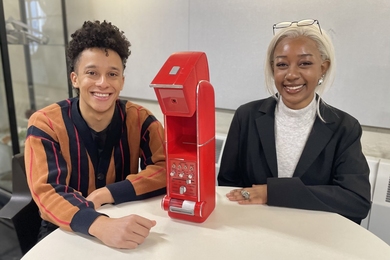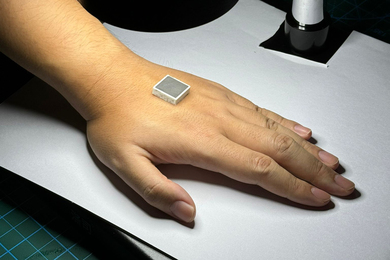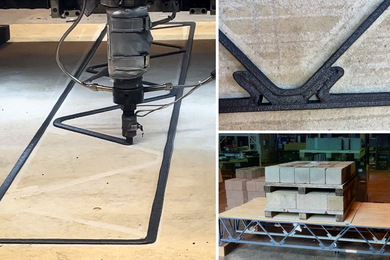CAMBRIDGE, Mass.--Mechanical engineering seniors in the Massachusetts Institute of Technology's course in Product Design Processes presented their newly designed, battery-powered, portable consumer products to an audience of about 90 judges from Boston-area design and product development firms last week.
Posing as entrepreneurs presenting prototypes to potential investors, representatives of each student team put on 10-minute presentations that included a product video, product demonstration with brief discussion of engineering innovations, marketing plan, business plan and request for investment dollars. The presentations took place on Wednesday, December 6.
Following a strenuous two-and-a-half month product development process that started with the conception of commercially viable product ideas, the six teams of students ended by engineering and fabricating the prototypes showcased last week. Each student team started out with $6,000 to use for designing and building their products from start to finish. Each team of 15- 20 students was first divided into A and B teams, each of which came up with three product ideas. One of those six was chosen for further development.
FINAL PRODUCTS
The crowd's favorite was the golf-teeing machine, a green translucent box slightly resembling a large home humidifier that holds 80 golf balls for use on a driving range. At the touch of a button, the Golf Teer sends a golf ball rolling down a chute and places it very precisely atop a rubber tee, ready for the golfer to swing. When turned on automatic, the Teer replaces the ball as quickly as it can be hit. Nothing is required of the golfer but continual swinging until all 80 balls have been driven. The Golf Teer 2000's estimated retail price is $350. Similar machines go for $1,199-$2,900, according to the students.
For those whose sport is baseball, one team demonstrated the Fielder's Choice, a training aid for fielders that shoots baseballs out at five trajectories ranging from 5-60 degrees with speeds between 15 and 65mph. The machine allows a single player to practice alone; behind the shooting device is a net that "catches" returned throws and funnels the baseballs back into the machine for the next round. The team demonstrated their product by letting it shoot plastic balls into the auditorium. The first ball was caught by a guest and thrown back into the net, much to the audience's delight. Estimated retail price: $1,096.
Other products included Laddy, a hand truck, ladder and lift in one. Laddy is a five-foot ladder attached to its own hand truck. Once the ladder is set up, the foot of the truck turns into an elevator to lift 200 pounds of tools to a height of four feet so the worker standing on the ladder can reach them. The team predicts they can manufacture Laddy for $180 and sell it for $500.
Blue Lightening, an emergency transport stretcher with straps that fit both children and adults, has also been equipped with an automatic leg retraction system, making it easier for EMTs to extend and retract the stretcher's legs for ambulance loading and removal. The team decided that the best marketing plan would be to license the patents to existing stretcher manufacturers. Estimated maximum price increase for the added features: $500.
Another team's product, SafeRide is a baby walker containing built-in sensors in the wheels that cause one of the back wheels to lock when the wheel approaches an electronic fence. If the child continues walking, she'll go round and round the locked wheel. A fence is made by taping a wire onto the floor, creating a "safe zone" for the child. Consumer price: $90. Manufacturer's price: $40.
The Incredible Haulk is a power-assisted bicycle trailer that can haul 100 pounds for 20 miles at 15mph on flat grade. Designed with two seats for children, the little green carriage hitches to the back of a bicycle. A load sensor located in the hitch is linked to a control system so the speed of the powered trailer exactly matches the speed of the bicycle. As the hitch extends when the cyclist outpaces the trailer, the control system alerts the motor, which kicks in to help. The Green team estimates the collapsible Haulk would sell for $1,000 and could be manufactured for $318.
David Wallace, the Esther and Harold Edgerton Associate Professor of Mechanical Engineering, is the lead faculty member for the course. Sponsors are the Lemelson Foundation, United Technologies, Ford Motor Co. and General Motors. More information can be found at http://web.mit.edu/2.009/www/.





